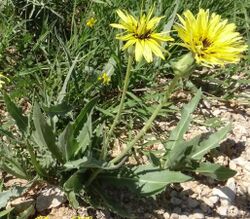Biology:Pseudopodospermum libanoticum
| Pseudopodospermum libanoticum | |
|---|---|

| |
| Scientific classification | |
| Kingdom: | Plantae |
| Clade: | Tracheophytes |
| Clade: | Angiosperms |
| Clade: | Eudicots |
| Clade: | Asterids |
| Order: | Asterales |
| Family: | Asteraceae |
| Genus: | Pseudopodospermum |
| Species: | P. libanoticum
|
| Binomial name | |
| Pseudopodospermum libanoticum (Boiss.) Zaika, Sukhor. & N.Kilian
| |
| Synonyms | |
| |
Pseudopodospermum libanoticum, also known as Lebanese salsify and Lebanese viper's grass, is a species of perennial plant in the family Asteraceae.[1][2][3]
Description
Pseudopodospermum libanoticum grows to a height of 15 to 80 cm (5.9 to 31.5 in) and is covered with fluffy detersile coating. Its erect flower stems are leafy and branched in the upper part into 3-5 floral heads measuring 2 to 4 cm (0.79 to 1.57 in). The flower heads are supported by a scaly receptacles atop long pedicels. It has glabrous cylindrical involucral bracts that are truncated at the base and slightly constricted at the top. The yellow flowers turn purple-red at the base and are larger than the involucre. It blooms in June and July. The fruit is a white, thick, long and deeply furrowed achene surmounted by a small pappus. P. libanoticum leaves are whole, slightly toothed towards the base, oblong or oblong-lanceolate, more or less acute that narrow at the petiole.[4][5]
Distribution and habitat
Pseudopodospermum libanoticum is endemic to the mountainous regions of the Levant in Lebanon and Syria;[6][7] it grows in elevated meadows and pastures, rocky and grassy grounds, and old wall cracks[4][5]
Uses
The plant is used in folk medicine, its aerial parts are made into a decoction used orally to treat headaches. The plant's raw young shoots and leaves are edible.[5]
References
- ↑ "Scorzonera libanotica Boiss. — The Plant List". http://www.theplantlist.org/tpl1.1/record/gcc-37170.
- ↑ "The Euro+Med Plantbase Project". Botanic Garden and Botanical Museum Berlin. 2006. http://ww2.bgbm.org/EuroPlusMed/PTaxonDetail.asp?NameId=128136&PTRefFk=7000000.
- ↑ "Biodiversity assessment and monitoring in the protected areas/ Lebanon LEB/95/G31". Horsh Ehden Nature Reserve and the Lebanese University Faculty of Science. August 2004. http://www.moe.gov.lb/ProtectedAreas/publications/FinalReportHorshEhden.pdf.
- ↑ 4.0 4.1 "Scorzonera libanotica Boiss" (in fr). Université Saint Joseph, Beyrouth. http://www.lebanon-flora.org/species.php?id_pl=315&bp=let&bp_let=s.
- ↑ 5.0 5.1 5.2 Arnold, N.; Baydoun, S.; Chalak, L.; Raus, Th. (2015). "A contribution to the flora and ethnobotanical knowledge of Mount Hermon, Lebanon". Flora Mediterranea 25: 27. http://www.bau.edu.lb/Library/Files/uploads/Raus.pdf.
- ↑ "Scorzonera libanotica | Cichorieae Portal". European Distributed Institute of Taxonomy. http://cichorieae.e-taxonomy.net/portal/cdm_dataportal/taxon/5040c51c-e644-4d93-b33e-57409ef913c7.
- ↑ "Distribution map". Botanic Garden and Botanical Museum Berlin. 2016. http://euromed.luomus.fi/euromed_map.php?taxon=421060&size=medium.
Wikidata ☰ Q12216408 entry
 |

